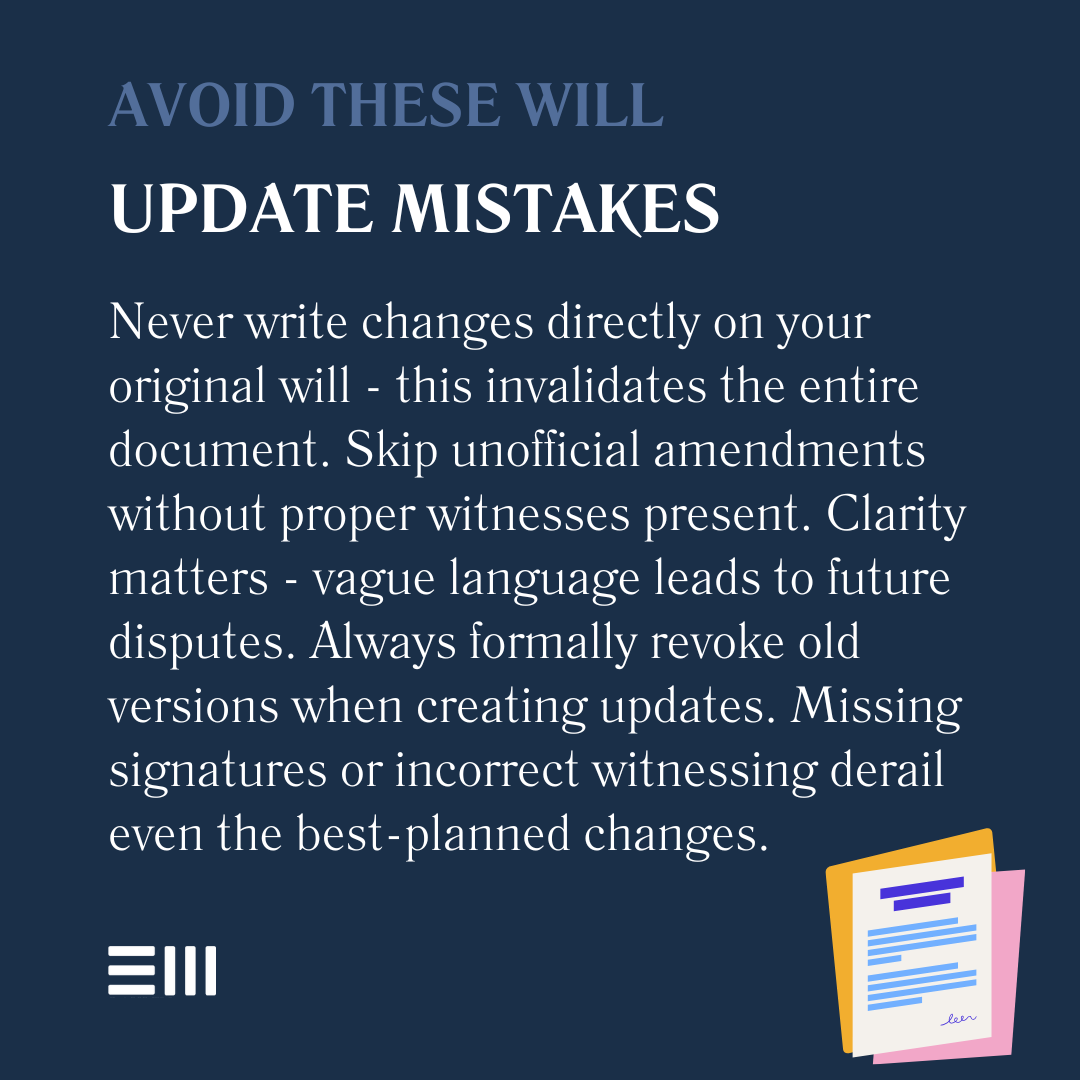Life rarely stays the same for long.
A job change takes you across state lines. A new grandchild brightens your family photos. A hard-earned promotion transforms your financial picture.
While these moments reshape our lives, they should also prompt us to revisit our estate plans.
For Alabama residents, keeping wills and trusts current ensures your legacy aligns with your life's evolution, protecting both your wishes and your loved ones' futures.
Understanding When to Update Your Estate Documents
Life's transitions often necessitate changes to your estate planning documents.
Before examining specific situations, let's explore the events that typically trigger the need for updates to your will or trust in Alabama.
- Marriage or divorce;
- Birth or adoption of children;
- Purchase or sale of significant property;
- Inheritance or substantial changes in assets;
- Relocation to or from Alabama;
- Changes in relationships with beneficiaries;
- Death of an executor, trustee, or beneficiary;
- Business ownership changes;
- Tax law modifications; and
- Changes in charitable giving goals.
Understanding these key life events helps you maintain current estate documents that accurately reflect your wishes and protect your beneficiaries. Regular reviews ensure your estate plan continues to serve its intended purpose.
The Process of Updating a Will in Alabama
Alabama maintains specific legal requirements for modifying existing wills to protect against fraud and ensure clear documentation of your wishes.
The state's probate courts carefully scrutinize will modifications to prevent potential disputes and ensure the testator's true intentions are honored.
Let's explore the proper procedures for updating your will.
Codicil Creation:
- Functions as an amendment to your existing will;
- Must be executed with the same formalities as the original will;
- Requires two witnesses and notarization in Alabama;
- Should clearly reference the original will's date and provisions being modified;
- Can address multiple changes but should be limited in scope;
- Must be stored with the original will; and
- Particularly useful for minor changes like updating executors or specific bequests.
Complete Rewrite:
- Creates an entirely new will that revokes previous versions;
- Often preferred for multiple changes or complex updates;
- Provides a clean slate for updated planning strategies;
- Eliminates potential confusion from multiple amendments;
- Allows incorporation of new tax planning techniques;
- Can address changed circumstances more comprehensively; and
- Recommended when significant life changes have occurred.
Formal Requirements:
- Written documentation of all changes meeting Alabama's legal standards;
- Signatures from two witnesses who aren't beneficiaries;
- Notarization (recommended but not required) to prevent challenges;
- Clear statement of intent to modify the existing will;
- Date and location of modification clearly stated;
- Reference to the original will's execution date;
- Proper attestation clause;
- Declaration of sound mind and free will;
- Clear identification of the testator;
- Proper pagination and initialing of multiple pages; and
- Secure storage of documents.
Common Mistakes to Avoid:
- Handwritten modifications on the original will;
- Unofficial amendments without witnesses;
- Unclear language about what's being changed;
- Failure to properly revoke previous versions;
- Missing signatures or improper witnessing;
- Improper storage of documents;
- Failure to inform executor of changes;
- Inconsistent provisions between documents;
- Ambiguous beneficiary designations;
- Inadequate consideration of tax implications;
- Failure to coordinate with other estate planning documents; and
- Not addressing changed circumstances completely.
Following these guidelines ensures your will updates meet Alabama's legal requirements and effectively communicate your wishes.
Working with an estate planning professional helps prevent common pitfalls that could invalidate your modifications and provides access to current legal strategies for protecting your assets.
Modifying a Living Trust in Alabama
Living trusts offer greater flexibility for updates compared to wills but still require careful attention to legal formalities.
Let's explore the proper procedures for trust modifications in Alabama.
Trust Amendment:
- Suitable for minor changes;
- Requires specific reference to original trust sections;
- Must be signed and notarized; and
- Keeps original trust intact.
Trust Restatement:
- Comprehensive update of entire trust;
- Preserves original trust date and assets;
- Recommended for multiple changes; and
- Creates cleaner documentation.
Required Steps for Modifications:
- Review trust's amendment provisions;
- Document specific changes clearly;
- Update trust schedules if assets changed;
- Obtain necessary signatures;
- Record real estate changes if applicable;
- Notify relevant financial institutions; and
- Update related documents (pour-over will, powers of attorney).
Understanding these modification options helps you choose the most appropriate method for your situation.
Proper documentation and execution ensure your trust continues to protect your assets and serve your beneficiaries effectively.
Common Questions About Updating Alabama Estate Documents
Alabama estate planning modifications often raise important questions.
Here are detailed answers to help Alabama residents better understand the update process.
How Often Should I Review My Estate Documents?
Estate planning professionals recommend annual reviews of your documents. However, certain life events should trigger immediate review:
- Marriage, divorce, or remarriage;
- Birth or adoption of children/grandchildren;
- Death of beneficiaries or fiduciaries;
- Significant asset changes;
- Business ownership changes; and
- Moving between states.
Regular reviews help ensure your estate plan remains current and effective in meeting your goals.
What Changes Require a Complete Rewrite vs. an Amendment?
Minor changes often work well as amendments:
- Updating executor or trustee;
- Adding or removing small bequests; and
- Changing beneficiary shares.
Consider complete rewrites for:
- Multiple previous amendments;
- Significant asset changes;
- Major family changes;
- Tax law impacts; and
- Moving to different state.
Understanding these distinctions helps you choose the most efficient and cost-effective update method for your situation.
What Happens if I Move to Another State?
Valid Alabama wills generally remain valid in other states. However, consider:
- Different estate tax laws;
- Community property rules;
- Executor requirements;
- Healthcare directive differences; and
- Power of attorney variations.
Reviewing your documents after relocation ensures they remain effective in your new state of residence.
Can I Update My Documents Without an Attorney?
While possible, professional guidance helps avoid:
- Invalid modifications;
- Unclear language;
- Unintended consequences;
- Tax implications; and
- Future legal challenges.
Professional assistance often saves time and money by preventing costly mistakes and future complications.
How Do I Ensure My Updates Are Legally Valid?
Follow these steps for valid modifications:
- Document changes properly;
- Obtain required witnesses;
- Include proper dates and references;
- Maintain clear records;
- Store documents securely; and
- Inform relevant parties.
Following these guidelines helps ensure your updates will be legally recognized and effectively implemented.
Plan Your Next Steps
Your Alabama estate plan should evolve with your life circumstances.
Our experienced team provides comprehensive guidance for updating your will or trust in Alabama.
Schedule a consultation to ensure your estate documents align with your current wishes and goals.


